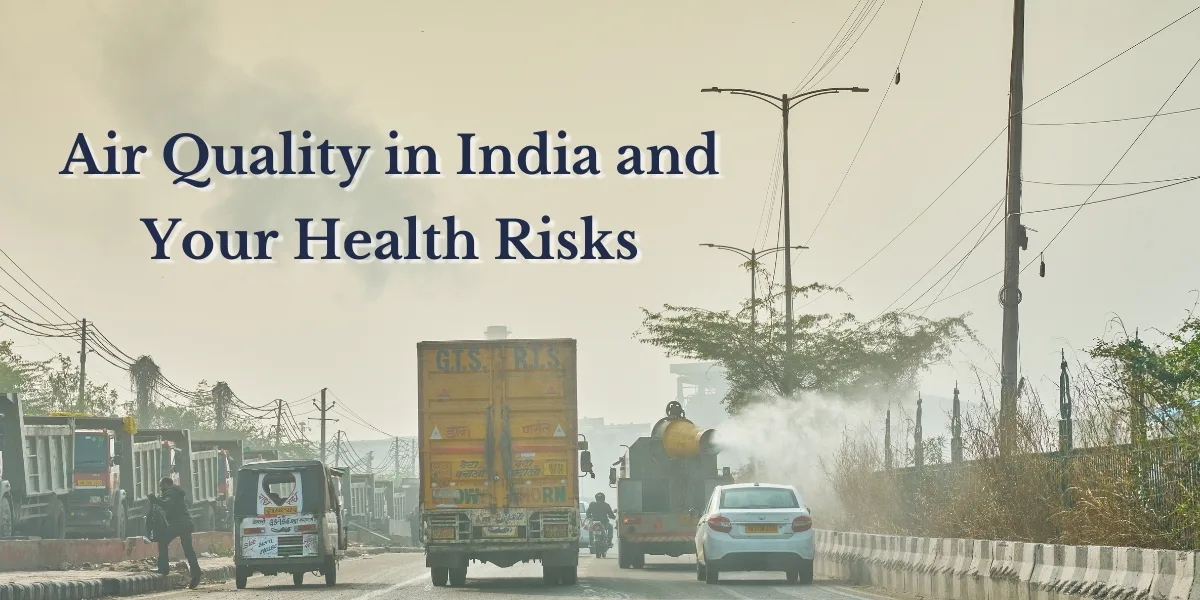The air quality in India that we breathe, particularly in cities like Kolkata, is increasingly a health hazard. Poor air quality, driven by urban emissions, industrial output, and rural practices like biomass burning, threatens millions. This article explores the health impacts of toxic air and offers practical precautions to protect yourself amidst India’s air quality crisis, emphasizing the urgent need for action to safeguard public health.
The Far-Reaching Impact of Toxic Air Quality in India on Our Health
Air pollution in India is a complex mix of particulate matter (PM2.5, PM10), nitrogen dioxide (NO2), sulfur dioxide (SO2), carbon monoxide (CO), ozone (O3), and volatile organic compounds (VOCs). These pollutants infiltrate the body through the respiratory system, triggering a range of health issues. Respiratory ailments are the most immediate consequence: asthma attacks intensify, chronic bronchitis develops, and lung cancer risks rise with prolonged exposure. Children with developing lungs, face heightened risks of asthma, reduced lung function, and lifelong respiratory complications.
In Kolkata, industrial zones, dense traffic, and seasonal agricultural burning in nearby regions elevate pollutant levels, making respiratory health a pressing concern. Beyond the respiratory system, the impact of poor air quality in India extends to virtually every organ in the human body. Studies have increasingly linked exposure to fine particulate matter (PM2.5), a key component of air quality in India’s pollution, to cardiovascular diseases, including heart attacks, strokes, and arrhythmias. These tiny particles can enter the bloodstream, causing inflammation, oxidative stress, and damage to blood vessels, all exacerbated by the poor air quality in India.

Neurological, Prenatal, and Mental Health Risks of Air Pollution in India
Neurological disorders, such as cognitive impairment, Alzheimer’s disease, and Parkinson’s disease, are also being increasingly associated with long-term exposure to air quality in India’s pollutants, as these harmful substances can cross the blood-brain barrier and exert neurotoxic effects. Furthermore, the concerning air quality has been implicated in adverse pregnancy outcomes, including preterm birth, low birth weight, and even stillbirths. The developing fetus is particularly susceptible to the harmful effects of maternal exposure to poor air quality.
The specific mix of pollutants in Kolkata and the duration of exposure to this compromised air quality in India can contribute to a higher prevalence of these systemic health issues, underscoring the need for localized research and interventions to address the unique challenges posed by the air quality to the city’s population. The psychological toll of living with poor air quality should also not be underestimated, with studies suggesting a link between air quality pollution and increased rates of anxiety, depression, and other mental health issues.

Essential Precautions: Shielding Yourself from Polluted Air Quality in India
The air quality in India has been a growing concern, significantly impacting health, especially in cities like Kolkata. While long-term solutions require systemic changes and stronger environmental policies, individuals must adopt daily practices to protect themselves. Here are some essential precautions:
Monitor Air Quality in India Regularly
Track real-time AQI updates through mobile apps and online platforms for your locality. Knowing the air quality in India, particularly in your area, helps you plan outdoor activities wisely.
Wear Protective Masks
Use high-quality masks , respirators on days when air quality is particularly poor. These masks can filter out harmful particulate matter (PM2.5) and reduce your risk of respiratory issues.
Improve Indoor Air Quality
Ventilate your home when outdoor air quality is better, and use HEPA-filter air purifiers to maintain a clean indoor environment. This is crucial given the widespread concerns over indoor and outdoor air quality.
Follow a Health-Boosting Lifestyle
Maintain a diet rich in antioxidants, stay hydrated, and perform light indoor exercises. These habits strengthen your body’s natural defenses against pollutants in the air quality of India.
Stay Clear of Traffic-Dense Zones
Avoid walking or exercising near high-traffic areas, especially during peak hours. Emissions from vehicles are a leading contributor to the deteriorating air quality.
Add Air-Purifying Plants Indoors
Indoor plants like aloe vera, spider plants, and peace lilies can help improve indoor air quality and offer a natural defense against pollutants infiltrating homes across India.
Monitor AQI Levels Regularly
Use mobile apps or online platforms to track the Air Quality Index (AQI) daily. Staying informed helps you make smarter choices about outdoor activities during periods of hazardous air quality.
Increase Community Awareness
Spread awareness about the dangers of prolonged exposure to air pollution in India. Encourage schools, communities, and workplaces to adopt safety measures and health education programs.
Advocate for Stronger Policy Measures
Support and push for stricter emission regulations, improved public transportation, and the adoption of clean energy solutions. These systemic changes are vital to improving the long-term air quality.
Support and Invest in Research
Encourage investment in localized studies that explore how pollutants impact health in Indian cities like Kolkata, where air quality concerns are especially pressing. Research can lead to better policy decisions and health interventions.
Adopt a Multi-Pronged Strategy
Experts agree: Tackling the crisis of air quality requires a combined effort—personal responsibility, community-wide awareness, and government-led action are all essential for sustainable change.
Summing Up
By consistently adopting these practices, residents can significantly reduce the health risks associated with poor air quality in India while pushing for broader systemic improvements. By taking collective and coordinated action, it is possible to safeguard public health against the serious dangers posed by deteriorating air quality in India.





